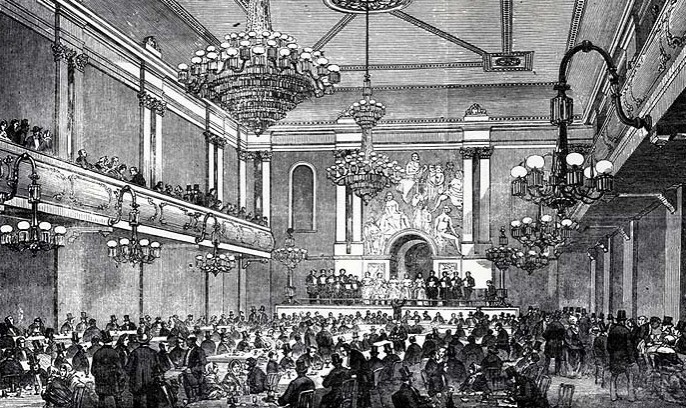For your business to thrive it has to be noticed. But is attention all you need? Does it help if you get noticed for a few brief seconds but are not remembered?
Let’s take a trip through the world of music hall acts to understand why B2B marketing isn’t just a battle for attention, but a battle to be remembered.
Music halls were the popular entertainment of the 19th and early 20th centuries. You could see every type of act there: comedians, jugglers, acrobats, singers, ventriloquists – you name it. There were hundreds of acts on the circuit doing basically the same thing.
By 1875 there were over 350 music halls in Greater London alone. That’s a lot of theatres needing goodness knows how many acts to fill their bills. Every act dreamed of one day being the ‘star turn.’
The Gimmick
When it came to comedians most had a gimmick. This could be a loud suit or unusual appearance (see Max Wall). The comedians, in particular, cultivated catchphrases and what we would today call straplines (the ‘Cheekie Chappie’). The gimmick had two purposes: to differentiate and to be memorable.
If you are a music hall act, as soon as you walk on stage you have attention. What every act wants is to be the one that people are talking about on their way home.
If you’re an aspiring bottom-of-the-bill comedian you know that people won’t remember your name. But, try being the only comedian on the circuit wearing flippers and a snorkel and you might have a chance.
People’s memories had little space for a comedian that looked like the others and delivered their gags in much the same way.
Remembered for the Right Reasons
The gimmick, of course, isn’t the whole story. You also had to entertain. ‘I saw that comedian in the frogman suit the other night, he was rubbish,’ isn’t the type of recall you want.
But if you are good and offer an enjoyable experience, the frogman suit helps people bring you to mind. They might seek out ‘the frogman of mirth’ when choosing which music hall to go to next.
So, what does this mean for B2B marketing, particularly for smaller businesses with ambitions to grow?
Some questions to ponder:
- What’s your ‘frogman suit?’ Is there anything in your marketing that makes you stand out from the competition?
- Do you tend to use similar images and words to your competitors?
- Do you have a distinctive tone of voice that sounds like your customers’?
- What’s the thing that people remember most about your business?
- Are you paying a fortune in paid search for attention, without being remembered?
Why Does Being Memorable Matter?
Think about the number of messages we see every day. I say see, but in most cases, we don’t. Our brains are adept at blinding us to irrelevance. Eye-tracking research shows that most of the links displayed in SERPS don’t even get seen as our mind searches out the familiar and trusted.
Also, although our businesses and brands are precious to us, they barely make a pin-prick in the consciousness of others. If your business blends into the anonymity of your sector, if you use similar words and images to your competitors, how will you come to mind at the right time?
Build recognition and you have something of lasting value. Sales leads don’t then just depend on paid sales activation campaigns.
‘Being Distinctive Wouldn’t Work For Us’
‘OK,’ you might be thinking, ‘I can see how this applies to consumer brands, but we offer serious B2B services. We have to be more cautious.‘
You want serious? Let’s talk accountancy.
A while ago I had the pleasure of writing the content for Blue Penguin Accountants. Believe me, the opportunity to write content for an accountancy website isn’t usually the stuff that gets B2B copywriters salivating.
But Peter, who owns the business, had a different take. He knew he couldn’t compete for attention and recall by ‘out-boring’ the normal boring accountancy websites. He also knew that prospects didn’t want to wade through pages of the minute detail of the services on offer. (You know, the stuff they already know that makes up 95% of the content on 99% of accountancy websites).
Together, we came up with a different and slightly irreverent take. But, while it was lighthearted, it was also focused on the things that clients really cared about: customer service and responsiveness.
One of my proudest achievements as a copywriter is that I got the phrase ‘Best of all, we don’t smell of fish’ into an accountancy website.
Does it work? Well, Peter has won numerous new clients who chose his business because the website seemed so different from other accountancy firms. Peter Watkins isn’t a memorable name, but who would forget a Blue Penguin?
And if a firm of chartered accountants can play by different rules to be memorable, why shouldn’t you?

